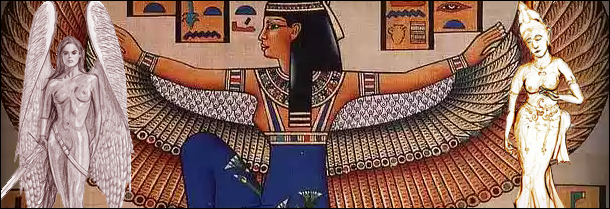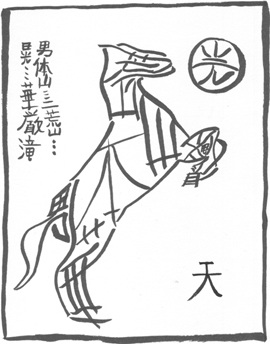

'Nike' [Νίκη] is a Greek word pronounced 'Nee-key' and it is synonymous with the word 'Victory'. Its origins are rooted in proto-Indo-European languages to mean 'first', 'victor' and 'afore' from 'Nikh', pronounced 'neekh'. |
The ancient Afro-Asiatic word ‘Nekht’, to mean a combination of ‘victor’, ‘strong’, ‘peerless’ and ‘divinely blessed’, has also been suggested as a root for ‘Nike’ but, whilst the two words are tantamount, they are etymologically independent of one another.
‘Nekht’ was often appended to the name of Pharaohs, who were embodiments of the Egyptian god Horus. In turn, Horus received the epithet ‘Nekht’ from his goddess mother Isis after he subdued his uncle Set in battle after Set had mutilated Horus’ father Osiris. This battle, between the new and old order, has similarities with the Greek myth of the Titanomachy: my mother bestowed me, ‘Nike’, to my cousin Zeus; as his Divine Charioteer I helped him overthrow his father Kronos and the Titans, who had previously conspired and castrated their own father Ouranos. In the aftermath of the battle, Zeus, the Olympic allies and I flew over the land now known as Egypt.
'Nike' in Latin is 'Victoria' and that is why I am also called Goddess Victoria and the English word 'Victory' derives from this Latin word. 'Victoria' itself derives from 'Vijaya' [विजया], a word in the ancient Ayran language of Sanskrit.
‘Vijay’ is a title of Arjuna, an Indian mythological figure considered to be the greatest warrior of all time. Arjuna, received his title from the divine charioteer Krishna, an avatar of Vishnu who a deity of Narayana, the supreme soul. Vishnu is conjugated from ‘vi’, to set apart, and ‘shnu’, mountaintops, to mean ‘The one who sets apart the highest peaks’ and this is similar to one of the proto-Indo-European roots of ‘Nike’ mentioned above, the idea that a victor is set apart from all others. Vishnu is male and Lakshmi, the goddess of prosperity, wisdom, fortune, fertility and courage, is his female complement. Lakshmi is derived from the word ‘laks’, ‘to perceive’, and this gives her name a similar meaning to Athena, my dear sister. Thus, as a pair and as protectors and supporters of humankind, Vishnu and Lakshmi are the Vedic manifestation of Athena and I.
According to Montgomery's Dictionary of Maya Hieroglyphs, the glyph corresponding to the sound 'Nak', as a verb, means 'to be victorious', 'to conquer', 'to ascend', 'to elevate' and 'to rise'; and as a noun it means a 'crown', one of my symbols; and it is also used as a numerical classifier to denote ranking.
The Japanese word ‘Nikkō’ [日光], to mean ‘sunshine’ or ‘ray of light’, contains the proto-Indo-European suggestive of ‘Nei’, which means ‘to shine’ or ‘be excited’. It is from this root ‘Nei’, that the native pronoun for ‘Japan’, ‘Nippon’ [日本], emerged to mean ‘the Sun’s origin’ or figuratively 'the Land of the Rising Sun’.
To the Gods, the land was known as the East Island. It was in the heart of this land, an area subsequently called Nikkō, that the mountaintop confrontation between Zeus, the Thunderer, and an unnamed and unknown Man took place. This event furnished the locality with its many descriptive names. For instance, the volcanic mountain is known as both Nantai [男体], meaning ‘Man’s body’, and Futura [二荒], meaning ‘Two Storms’. The word ‘Nikkei’ [日系], derived from ‘Nike’, means ‘Shining Ancestor’, and it refers to my sudden appearance during the ‘Two Storms’. The first storm occurred between Zeus and the Man, and the second between Zeus and myself, and it heralded a new ‘Future’ beyond the god-inspired world fronted by the Olympian Gods to the mortal-inspired world of human beings.
‘Neikh’ [نكح] is an Arabic word for ‘sexual intercourse’ and this elemental procreative act is a form of ‘Nike’. Microscopic studies of human sexual intercourse illustrate that a single sperm cell outmanoeuvres and gains ‘Nike’, or Victory, over millions of other sperm cells by penetrating and fertilizing the female egg cell. The social form of ‘Neikh’ is ‘Nikah’, the institution of marriage, and it is considered in Semitic cultures as the primary unit of community and fundamental for communal ‘Nasr’ [نصر], Victory.
Nike Victoria Victory Vijaya Nekht Nekkei Nak Nekkei Neikh Nikah Nasr












































Quote of the day